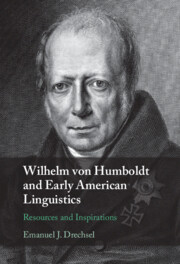Book contents
- Wilhelm von Humboldt and Early American Linguistics
- Wilhelm von Humboldt and Early American Linguistics
- Copyright page
- Dedication
- Contents
- Figures and Tables
- Maps
- Preface
- Acknowledgments
- Part I Wilhelm von Humboldt and the Americas
- Part II The Early Lives of Wilhelm and Alexander von Humboldt
- Part III Wilhelm von Humboldt’s Americanist Linguistics
- Part IV Wilhelm von Humboldt’s Impact on Americanist Linguistics and Anthropology
- 10 First Generation of American Humboldtians of the Early Nineteenth Century
- 11 Second Generation of American Humboldtians in the Nineteenth Century
- 12 Third and Fourth Generations of American Humboldtians at the Turn of the Twentieth Century
- Part V Wilhelm von Humboldt as an Americanist Linguist and Anthropologist
- Book part
- References
- Index
10 - First Generation of American Humboldtians of the Early Nineteenth Century
American Languages in Comparative Linguistics (Duponceau, Pickering, and Gallatin)
from Part IV - Wilhelm von Humboldt’s Impact on Americanist Linguistics and Anthropology
Published online by Cambridge University Press: 11 January 2024
- Wilhelm von Humboldt and Early American Linguistics
- Wilhelm von Humboldt and Early American Linguistics
- Copyright page
- Dedication
- Contents
- Figures and Tables
- Maps
- Preface
- Acknowledgments
- Part I Wilhelm von Humboldt and the Americas
- Part II The Early Lives of Wilhelm and Alexander von Humboldt
- Part III Wilhelm von Humboldt’s Americanist Linguistics
- Part IV Wilhelm von Humboldt’s Impact on Americanist Linguistics and Anthropology
- 10 First Generation of American Humboldtians of the Early Nineteenth Century
- 11 Second Generation of American Humboldtians in the Nineteenth Century
- 12 Third and Fourth Generations of American Humboldtians at the Turn of the Twentieth Century
- Part V Wilhelm von Humboldt as an Americanist Linguist and Anthropologist
- Book part
- References
- Index
Summary
Humboldt personally inspired American linguists of the early nineteenth century such as Peter S. Duponceau and John Pickering (both by correspondence) plus A. Albert Gallatin (probably in person by Alexander’s introduction and perhaps by correspondence) as the first generation of American Humboldtians. Whereas Duponceau had already been impressed by Humboldt’s sociolinguistic field study of Basque, he and Pickering responded to Humboldt’s inquiries for information on North American languages; but Duponceau and Pickering also drew on the Prussian as a descriptive-analytical linguist with a broad hemispheric, even global comparative foundation, a solid interest in linguistic-cultural alterity and diverse language use, language change, and linguistic typology. Thus, they came to share a broad range of linguistic topics. In contrast, Gallatin likely found primary inspiration in Humboldt's early model of linguistic cartography for his own early maps of American languages and for his cultural ecology with language at the center.
Keywords
- Type
- Chapter
- Information
- Wilhelm von Humboldt and Early American LinguisticsResources and Inspirations, pp. 195 - 222Publisher: Cambridge University PressPrint publication year: 2024



